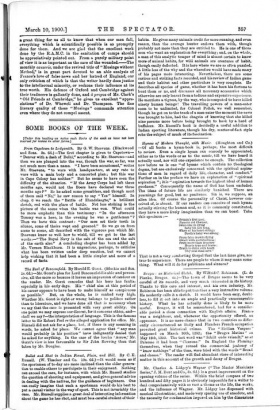The Earl of Beaconsfield. By Harold E. Gent. (Blackie and
Son. 2s. 6d4—Mr. Gorst's plea for Lord Beaconsfield is able and persua- sive, all the more so because it leaves an impression of candour on the reader. Mr. Gorst concedes that his hero has faults, especially in his early days. His" chief aim at this period of his career appears to have been to make himself as conspicuous as possible." But, on the whole, he is ranked very high. Whether Mr. Gorst is right or wrong belonge to politics rather than to literature, and we have done all that is necessary when we say that the case is presented with very great ability. On one point we may express our dissent, for it concerns ethics, and— shall we say ?—the interpretation of language. This is the famous letter to Sir Robert Peel re the alleged application for office. Mr. Disraeli did not ask for a place, but, if there is any meaning in words, he asked for place. We cannot agree that "any man would probably in his position have indignantly denied that he asked for anything. In the case of the lorclut Arrow,' Mr. Gerst's view is leas favourable to Sir John 13owring than that taken by Mr. Douglas.






































 Previous page
Previous page